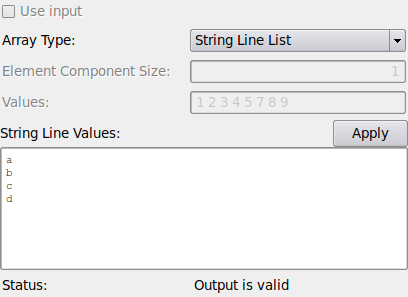MLToVTKArray¶
-
MLModule¶ genre VTKAdaptersauthor MeVis Medical Solutions AGpackage MeVisLab/VTKdll MLVTKAdaptersdefinition VTKAdapters.def see also ImageLoad,LocalImage,SoVTK,MLToVTKImage,VTKToMLImage,vtkView,WEMToVTKPolyData,VTKPolyDataToWEM,MLBaseToVTKPolyDatakeywords convert,loader,memory,source,input,translate,transfer,reformat,cross,interface,adapter
Purpose¶
The MLToVTKArray module offers a simple way to create vtk arrays, just by specifying a number of values in a field or by connecting an ML base object containing point, vector or scalar like structures. The number of tuples in the created array and results from Element Component Size and the number of specified values. If the number of specified values is not dividable by Element Component Size then only the number of tuples is created which can be filled completely with values.
Details¶
The example network shows a MLToVTKArray module creating a vtkDoubleArray from the connected XMarkerListContainer. The array properties can be seen in the array subpanel of the VTKInputInfos module. You can switch the Use Input toggle to specify the array with values from Values field alternatively.
Tips¶
With field connections the values field can simply be filled with points, vectors or other numeric values from other modules.
Input Fields¶
Output Fields¶
Parameter Fields¶
Field Index¶
Array Type: Enum |
Element Component Size: Integer |
Status: String |
String Line Values: String |
Use Input: Bool |
Values: String |
Visible Fields¶
Array Type¶
-
name:arrayType, type:Enum, default:Bit¶ Specifies the type of array to be set at the output. All selections but the last one define numeric array types which also can be composed in tuples. The last selection “StringLineList” disables the option for input connector usage and for numeric tuple selection- then only the
String Line Valuescan be used for value inputs. All unused input fields are made insensitive in this case.
Values:
| Title | Name |
|---|---|
| Bit | Bit |
| Char | Char |
| Double | Double |
| Float | Float |
| Id Type | IdType |
| Int | Int |
| Long | Long |
| Short | Short |
| Signed Char | SignedChar |
| Type Float32 | TypeFloat32 |
| Type Float64 | TypeFloat64 |
| Type Int16 | TypeInt16 |
| Type Int32 | TypeInt32 |
| Type Int64 | TypeInt64 |
| Type Int8 | TypeInt8 |
| Type UInt16 | TypeUInt16 |
| Type UInt32 | TypeUInt32 |
| Type UInt8 | TypeUInt8 |
| Unsigned Char | UnsignedChar |
| Unsigned Int | UnsignedInt |
| Unsigned Long | UnsignedLong |
| Unsigned Short | UnsignedShort |
| String Line List | StringLineList |
Element Component Size¶
-
name:elementComponentSize, type:Integer, default:1, minimum:1, maximum:10¶ Number of components in each tuple.
Values¶
-
name:values, type:String¶ All values to be stored in array
Element Component Sizeelements define one tuple, default is “”, thus no values are specified. The number of specified values divided byElement Component Sizeimplicitly specifies the number of tuples in the created array. The division result is rounded down if necessary.
String Line Values¶
-
name:stringLineValues, type:String¶ This field allows the specification of string values. each line defines a string which is inserted as one entry in a vtkStringArray if the
Array TypeStringLineList is selected.
Use Input¶
-
name:useInput, type:Bool, default:FALSE¶ If enabled the values to be used for the array are retrieved from the input connector. Supported are PointLists, VectorLists and XMarkerLists and XMarkerListContainer values, default is off. The number of values retrieved from the list divided by
Element Component Sizeimplicitly specifies the number of tuples in the created array. The division result is rounded down if necessary.
